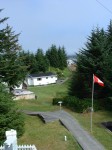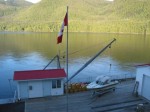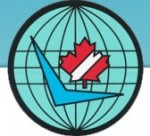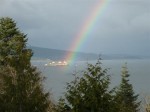Note:- How to obtain an up-to-date weather report from a BC lighthouse

One of the duties on most of the lighthouse stations, and especially on McInnes Island, up to 2003, was the reporting of local weather (weather visible in the immediate area of the station) to Environment Canada (EC) – earlier called the Atmospheric Environment Service (AES) – for re-broadcast to boaters, pilots and climatologists.
This became even more important after the Tropical Storm of October 1984 hit the British Columbia coastline.

Every three hours during the day, starting at around three o’clock in the morning we would collect the information on sky condition, visibilty, wind speed and direction, rain/snowfall, wet and dry bulb temperatures plus maximum and minimum temperatures, station pressure and tendency (whether pressure was rising or falling and how rapidly), and sea and swell height. This was then recorded on AES forms or in a notebook depending on the station. Not all stations reported or had the instruments for all observations. These records were forwarded to AES every month along with a Climate Summary for the month. Continue reading Weather Observing – a Large Part of the Job







